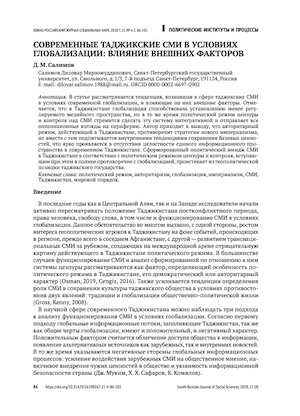Abstract
The article discusses the trend in the Tajik media in the context of modern globalization and the external factors affecting them. It is noted that in Tajikistan globalization has contributed to the establishment of a less regulated media space; at the same time, the political regime of censorship and media control seeks to make the system integrative and sends all opposition views to the periphery. Consequently, the developed media strategy, based on the political regime of censorship and control of the media in Tajikistan, is in complete contradiction with globalization. The author concludes that the authoritarian regime in Tajikistan is contrary to the strategy of the new imperialism; at the same time, however, it is fuelled by internal tendencies to preserve basic values, which is evident in the lack of integrity of a common information space in modern Tajikistan.
Keywords
References
Абдулло, Р.Г. (2015, Июль 20). Мягкая сила РФ и ее проецирование на Таджикистан, пока не представляют какой-либо серьезной угрозы. Режим доступа https://cabar.asia/ru/rashid-gani-abdullo-o-myagkoj-sile-rossii-v-tadzhikistane
Асеев, А.Д. Шишков, В.В. (2019). Империя в зеркале геополитики. Управление, 1, 121–127.
Валлерстайн, И. (2001). Мир, в который мы вступаем: 2000–2050 гг. Россия и современный мир, 1, 64–75.
Гобсон, Дж. (1927). Империализм. Ленинград: Прибой.
Гоибназарова, Т.С. (2014). Масс-медиа и искусство Таджикистана в контексте глобализации (на примере печатных СМИ). Душанбе: Российско-Таджикский (Славянский) университет.
Ибрагимов, А.Г. (2020) Внешнеполитические приоритеты РФ в начале XXI века. Постсоветские исследования, 1, 19–25.
Комилов, К. (2014). Мушкилоти табдили сиёсати иттиолоти дар шароити чахонишави. Номаи донишгоҳи давлатии Хуҷанд ба номи академик Б. Ғафуров. Илмхои гуманитари, 1, 62–67.
Красильников, О.Ю. (2017). Глобальный контроль над Интернет как новый признак империализма. Территория науки, 3, 57–60.
Кузнецов, В.И. (1998). Что такое глобализация? Мировая эканомика и международные отношания, 2, 13–20.
Мирзоали, С. (2015). СМИ Таджикистана в условиях глобализации информации. Вестник Таджикского национального университета. Серия филологических наук, 4, 251–255.
Муким, Ч. (2005). Радио «Свобода»: ложь и правда. Душанбе: Деваштич.
Муким, Ч. (2006). Сиёсат ва чанги иттиллооти. Душанбе: Деваштич.
Муким, Ч. (2017, Декабрь 3). Накши радиои «Озоди» дар фазои иттилоотии Точикистон. Режим доступа https://jovidmuqim.wordpress.com/2017/12/03/нақши-радиои-озодӣ-дар-фазои-иттило/
Мукимов, М.А. (21 ноября, 2018). Шабакахои пахши Шарки наздик таргибгари манфиатхои ИМА. Режим доступа https://jovidmuqim.wordpress.com/2018/11/21/shabakahoi-sharqi-nazdik-targibgari-manfiathoi-ima/
Мукимов, М.А. (20 декабря, 2019). «Садои Америка» дастгохи таргиботии хукумати ИМА. Режим доступа https://jovidmuqim.wordpress.com/2019/12/20/sadoi_amerika_dastgohi_targibotiihukumati_ima/
Мукимов, М.А. (28 ноября, 2019). Радиои «Фардо» таргибгари сиёсати ИМА. Режим доступа https://jovidmuqim.wordpress.com/2019/11/28/radioi_fardo_targibgari_siyosati_usa/
Мукимов, М.А. (2019). Радиои «Осиёи озод» дастгохи таргиботии ИМА. Паёми Донишгохи миллии Точикистон. Бахши илмхои филологи, 2, 320–325.
Муҳаммади, Ф. (2015, Сентябрь 15). Гавго дар атрофи «даъвои Чин ба Помир» ба кучо расид? Режим доступа https://www.ozodi.org/a/bahs-bar-sari-pomir-ba-kujo-rasid/30839320.html
Неймарк, М.А. (2020). Внешняя политика России: от «нового мышления» к новому стратегическому мышлению. Проблемы постсоветского пространства, 7, 171–189.
Рогов, И.И. (2010). Империя и империализм: история понятий и современный мир. Terra Economicus, 3, 260–267.
Рогов, И.И. (2011). Концептуализация понятия «Империализм» в классической социальной мысли. Государственное и муниципальное управление. Ученые записки, 4, 102–110.
Сафаров, Х. (2013). Место средств массовой информации России в информационном пространстве Республики Таджикистан. Душанбе: Таджикский национальный университет.
Сергеев, В.М., Казанцев, А.А., Медведева, С.М. (2020). Территориальная неоднородность глобализации и порождаемые ею типы конфликтов. Полис. Политические исследования, 1, 44–61.
Сморгунов, Л.В. (2006). Сценарии политического управления в глобализирующемся мире. Вестник Санкт-Петербургского университета. Политология. Международные отношения, 3, 42–47.
Субетто, А.И. (2008). Империалистическая глобализация и ноосферный социализм: экологическая гибель или спасение человечества. Общество. Среда. Развитие (Terra Humana), 1, 135–157.
Султонов, М.М. (2012). Влияние глобализационных процессов на информационное пространство Таджикистана. Вестник Кыргызско-Российского Славянского университета, 8, 88–98.
Тоффлер, Э. (2003). Метаморфозы власти. Москва: ACT.
Усмонов, И. (2003). Средсва массовой информации и внешняя политика Таджикистана. Душанбе: Сино.
Хардт, М., Негри, A. (2004). Империя. Москва: Праксис.
Холназаров, Ш. А (2012). Геополитические действия России в освещении таджикских СМИ. Вестник Новосибирского государственного университета. Серия: История. Филология, 11, 32–37.
Хомидов, Д. (2012). Конкурентоспособность таджикских СМИ в условиях глобализации. Вестник таджикского национального университета. Серия филологических наук, 4, 250–255.
Цветкова, Н.А. (2007). Cultural imperialism: международная образовательная политика США в годы «холодной войны». СПб.: Изд-во СПбГУ.
Шарапов, О.М. (2015). Политический процесс в Таджикистане и его влияние на интеграционные приоритеты республики в постсоветском пространстве. Душанбе: Таджикский нац. ун-т.
Allen, J. Hamnett, C.A. (1995). Shrinking World?: Global Unevenness and Inequality. New York: Oxford University Press.
Cengiz, G. (2016). Post-Soviet Politicized Media and Free Press within the Context of Central Asian Countries. International Journal of Social Science and Humanity, 6, 909–912.
Entman, R.M. (2004). Projections of Power: Framing News, Public Opinion, and U.S. Foreign Policy. Chicago: University of Chicago Press.
Gross, P, Kenny, T. (2008). Journalism in Central Asia: A Victim of Politics, Economics, and Widespread Self-censorship. The International Journal of Press/Politics, 13, 515–525.
Kroes, R. (1993). Cultural Transmissions and Receptions: American Mass Culture in Europe. Amsterdam: University of Amsterdam Press.
Osman, W. (2019). Between the White House and the Kremlin: A Comparative Analysis of Afghan and Tajik Media. International Journal of Communication, 13, 619–641.
Pells, P. (2000). Who’s Afraid of Steven Spielberg? Diplomatic History, 3, 495–502.
Pells, R. (1997). Not Like US: How Europeans Have Loved, Hated, and Transformed American Culture since World War II. New York: Oxford University Press.
Poiger, U. (1999) Beyond Modernization and Colonization. Diplomatic History, 1, 45–55.
Shahrani, N. (2017, Октябрь 31). On Greater Central Asia, regional integration and stability. Режим доступа https://caa-network.org/archives/10627
Shahrani, N. (2017, Октябрь 31). On Greater Central Asia, regional integration and stability. Retrieved from https://caa-network.org/archives/10627
Yazdani, E. (2007). US Democracy Promotion Policy in the Central Asian Republics: Myth or Reality? International studies, 2, 141–155.


